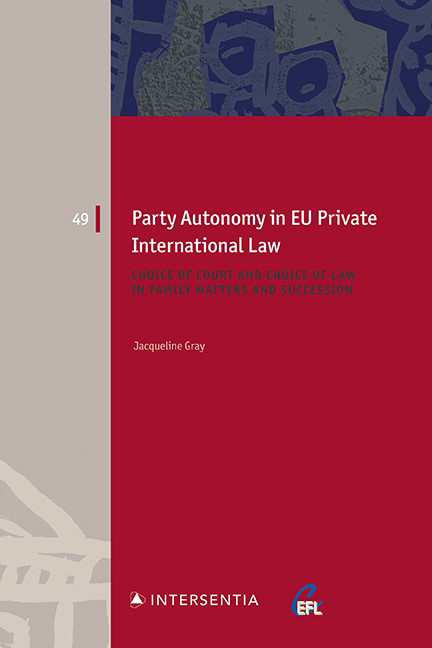 Party Autonomy in EU Private International Law
Party Autonomy in EU Private International Law Published online by Cambridge University Press: 25 May 2021
INTRODUCTION
The previous chapter presented the first step in examining the content of the choice of court and choice of law within the EU private international law framework on family matters and succession by outlining the direct connections through which party autonomy can be exercised in this setting. We now turn to evaluate the second type of provision found within this present framework: choice of court and choice of law provisions that allow related areas to be linked together (‘coordinating provisions‘).
Chapter 3 has outlined the potential problems concerning access to justice that arise from a lack of coordination and cohesion between the law and court, or between related subject areas in the cross-border context. Such related areas can be divided into two groupings of proceedings that oft en occur in conjunction with one another: (i) those that are connected with the dissolution of a marriage by divorce or legal separation or the dissolution of a registered partnership (proceedings dissolving the relationship, in conjunction with the dissolution of the property regime, maintenance and/or parental responsibility), and (ii) and those that arise upon the death of a spouse or registered partner (succession proceedings in conjunction with the dissolution of a matrimonial property regime or the division of the property of the registered partners). To summarise once more for the purposes of the present chapter, a lack of coordination in this regard may result in tangible problems such as having to travel between Member State jurisdictions to attend closely related proceedings within a short amount of time, and increased costs and complexity from the need to apply foreign law, as well as more subjective issues such as laws that are not compatible being applied to interlinked processes. Although such problems can be tackled to an extent by manually coordinating particular direct connections (as outlined in section 6.5.3. of the previous chapter), the EU legislator has also created provisions with the sole function of achieving coordination.
To save this book to your Kindle, first ensure [email protected] is added to your Approved Personal Document E-mail List under your Personal Document Settings on the Manage Your Content and Devices page of your Amazon account. Then enter the ‘name’ part of your Kindle email address below. Find out more about saving to your Kindle.
Note you can select to save to either the @free.kindle.com or @kindle.com variations. ‘@free.kindle.com’ emails are free but can only be saved to your device when it is connected to wi-fi. ‘@kindle.com’ emails can be delivered even when you are not connected to wi-fi, but note that service fees apply.
Find out more about the Kindle Personal Document Service.
To save content items to your account, please confirm that you agree to abide by our usage policies. If this is the first time you use this feature, you will be asked to authorise Cambridge Core to connect with your account. Find out more about saving content to Dropbox.
To save content items to your account, please confirm that you agree to abide by our usage policies. If this is the first time you use this feature, you will be asked to authorise Cambridge Core to connect with your account. Find out more about saving content to Google Drive.